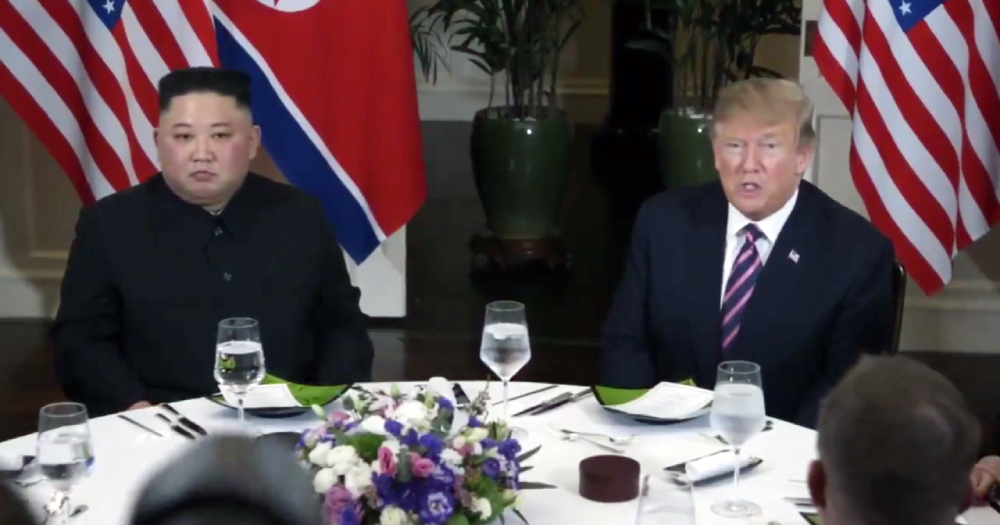North Korean leader Kim Jong-un and United States President Donald Trump met for the second time in Hanoi, Vietnam, on Wednesday, Feb. 27.
But unlike the first time they met in Singapore where they signed a joint agreement, no joint agreement was signed this time.
Summit cut short
The summit was cut short at around 3pm on Thursday, Feb. 28 when Kim and Trump were seen leaving the Sofitel Legend Metropole hotel separately where discussions were being held.
Kim Jong Un leaves the Metropole without a joint signing ceremony pic.twitter.com/TefzCfab8J
— Oliver Hotham (@OliverHotham) February 28, 2019
After both leaders left, the White House released a statement saying that while they had "very good and constructive meetings in Hanoi", no agreement was reached this time.
Nevertheless, they "look forward to meeting in the future".
Full statement on 2nd #TrumpKimSummit from @PressSec. pic.twitter.com/m7PsHruzI7
— Steve Herman (@W7VOA) February 28, 2019
This is in spite of Trump saying a day before that "a lot of things are going to be solved" after meeting Kim for a one-on-one chat, according to The Washington Post.
However, on Thursday, Feb. 28, hints of trouble appeared when Trump played down expectations regarding any kind of agreement to be made at the summit.
Instead, he emphasised the importance of longer-term relations between the two countries, reported The Guardian.
Trump says Kim promised no more nuclear testing
At the press conference held at Marriott hotel before he leaves for the airport, Trump said he felt it was not "very appropriate to sign an agreement today".
However, he gave a positive outlook of the talks with Kim, saying that Kim promised there would be "no more testing of rockets and nuclear", and that he trusts Kim.
"There will be no more testing of rockets and nuclear. I trust him and take him at his word"
— BBC News (World) (@BBCWorld) February 28, 2019
US President Donald Trump following breakdown of talks with North Korean leader Kim Jong-un in Vietnam#Hanoisummit latest: https://t.co/CbibiArgBi pic.twitter.com/zTXzDWALXZ
Nuclear deadlock
Even before the Vietnam summit took place, some analysts were pessimistic about the outcome.
This is because both leaders have different understandings on what denuclearisation involves.
While Pyongyang sees denuclearisation as inclusive of certain compromises from the U.S., such as the lifting of sanctions and the withdrawal of American troops from South Korea, Trump does not see it that way.
Before the summit took place, Trump said that sanctions on the isolated country will remain unless Pyongyang does “something that’s meaningful” on denuclearisation.
U.S. intelligence officials also said it is unlikely that Pyongyang will give up its nuclear programme entirely, as it sees nuclear weapons as essential for its national security, reported Reuters.
Future talks?
Shawn Ho, an Associate Research Fellow at the S. Rajaratnam School of International Studies (RSIS), told Mothership that the failure to produce a joint agreement with North Korea this time means Trump will face even greater domestic pressure back home.
Michael Cohen, Trump's former lawyer, has given testimony back home, which piled on political pressure on the president to bring back good news from Hanoi and deflect some of the bad press.
But he has failed to do that on the foreign policy front.
Nevertheless, Ho said that it is still too early to come to a conclusion regarding future denuclearisation negotiations between both countries.
He said one thing to look out for is South Korean President Moon Jae-in's speech on Friday, March 1.
Moon is expected to offer new proposals for inter-Korean engagement during a ceremony that marks the 100th anniversary of a 1919 uprising by Koreans against Imperial Japan's colonial rule.
He might try to keep Trump on board talks with North Korea, in order to keep the peace process going.
However, the fact that the summit was cut short without any joint agreement being signed despite plans to do so, indicates deeper, irreconcilable differences between both leaders.
Top image via Donald J. Trump/Twitter
If you like what you read, follow us on Facebook, Instagram, Twitter and Telegram to get the latest updates.
